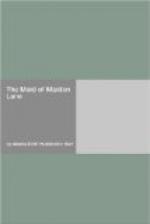“I have desired to do so for two weeks, Cornelia,” answered Mrs. Moran. “I think our visit has already been too long.”
“My Cousin Silas has now begun to make love to me; and his mother and sisters like it no better than I do. I hate this town with its rampant, affected fashion and frivolities! It is all a pretence! The people are naturally saints, and they are absurd and detestable, scheming to make the most of both worlds—going to meeting and quoting texts—and then playing that they are men and women of fashion. Mother, let us go home at once. Lucinda can pack our trunks to-day, and we will leave in the morning.”
“Can we go without an escort?”
“Oh yes, we can. Lucinda will wait on us—she too is longing for New York—and who can drive us more carefully than Cato? And my dear mother, if Silas wants to escort us, do not permit him. Please be very positive. I am at the end of my patience. I am like to cry out! I am so unhappy, mother!”
“My dear, we will go home to-morrow. We can make the journey in short stages. Do not break down now, Cornelia. It is only a little longer.”
“I shall not break down—if we go home.” And as the struggle to resist sorrow proves the capacity to resist it, Cornelia kept her promise. As they reached New York her cheerfulness increased, and when they turned into Maiden Lane, she clapped her hands for very joy. And oh, how delightful was the pleasant sunny street, the familiar houses, the brisk wind blowing, the alert cheerful looking men and women that greeted each other in passing with lively words, and bright smiles! O how delightful the fresh brown garden, in which the crocuses were just beginning to peep, the bright looking home, the dear father running with glad surprise to greet them, the handsome, pleasant rooms, the refreshing tea, the thousand small nameless joys that belong to the little darling word “Home.”
She ran upstairs to her own dear room, laid her head on her pillow, sat down in her favourite chair, opened her desk, let in all the sunshine she could, and then fell with holy gratitude on her knees and thanked God for her sweet home, and for the full cup of mercies He had given her to drink in it.
When she went downstairs the mail had just come in, and the Doctor sat before a desk covered with newspapers and letters. “Cornelia,” he cried in a voice full of interest, “here is a letter for you—a long letter. It is from Paris.”
“It is from Arenta!” she exclaimed, as she examined the large sheets closed with a great splash of red wax, bearing the de Tounnerre crest. It had indeed come from Paris, the city of dreadful slaughter, yet Cornelia opened it with a smiling excitement, as she said again:—
“It is from Arenta!”
CHAPTER XI
WE HAVE DONE WITH TEARS AND TREASONS
“Here is a letter from Arenta!” repeated the Doctor to his wife, who was just entering the room, “Come, Ava, and listen to what she has to say. I have no doubt it will be interesting.” Then Cornelia read aloud the following words:




